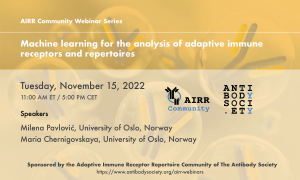Machine learning for the analysis of adaptive immune receptors and repertoires
Speakers: Maria Chernigovskaya, University of Oslo and Milena Pavlović, University of Oslo
Adaptive immune receptor repertoires (AIRRs) capture past and present immune responses and therefore represent a powerful resource for developing diagnostics and therapeutics. Machine learning (ML) has the ability to discover complex sequence patterns and help further these diagnostic and therapeutic aims. However, to exploit these opportunities, it is necessary to overcome the intrinsic challenges of AIRR data: unknown rules determining antigen binding, high diversity and specificity of receptors with low overlap between AIRRs, and low signal-to-noise ratio. Further, different ML approaches need to be validated and compared before they could be deployed in practice. In this webinar, we will focus on standardized and reproducible ML workflows, benchmarking, and comparison of AIRR ML approaches. We will argue for the use of simulation for validation and benchmarking of ML methods before moving to experimental datasets.
Maria Chernigovskaya is a PhD candidate supervised by Prof. Victor Greiff and Prof. Geir Kjetil Sandve at the University of Oslo, Norway. Maria is working on a methodology for simulating synthetic adaptive immune receptor repertoire (AIRR) datasets to guide the development and benchmarking of AIRR-based machine learning.
Milena Pavlović is a postdoctoral researcher in the Sandve lab at the University of Oslo working on machine learning, causal inference, and their application to biomedical domains. During her PhD, Milena developed the immuneML platform (https://immuneml.uio.no) for the analysis of adaptive immune receptors and repertoires (AIRR), focusing on model robustness and reproducibility, and examined how the knowledge of the data generating process and the causal inference framework could improve AIRR machine learning diagnostics.
Registration is open!


